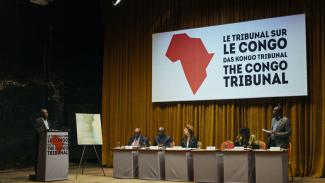Summer Special
Constructed justice
 Press photo
Press photo
In reality there is no Congo tribunal. What the film shows is fiction: the judges’ bench and witness stand are constructed on a theatre stage, and at the beginning of each session, the clapperboard claps. The crimes, however, are real. And so are the feelings that show on the faces of victims, witnesses and observers: rage, sadness, desperation, helplessness. Some speak with a shaking voice, others have tears in their eyes.
The Congo Tribunal by Swiss director Milo Rau deals with crimes against the people of South Kivu, a province in eastern DRC. It is a rich region with exceptionally fertile land and precious mineral resources. But the people who live there don’t profit from this wealth – on the contrary, it brings them the worst evils. Eastern Congo is a battlefield for a multitude of ruthless armed groups (see interview with Christoph Vogel in D+C/E+Z e-Paper 2018/02, p. 26).
International mining corporations, exploiting gold, diamonds and rare earths on a large scale for the world market, destroy the local people’s livelihoods. Many are evicted without compensation. Many lose their work, because they themselves used to dig in the mines that now belong to multinational companies. Goats die because of poisonous water, and agriculture is impossible in the contaminated areas.
On top of that there are various rebel groups fighting for power and natural resources, who attack mining corporations, each other and innocent villagers. Murder, rape and human-rights violations of all kinds are daily business. The film shows all this in a way that is rather sober and documentary than emotional and accusing. And – from what we know about this world region – all this is real. Armed conflicts have been haunting eastern DRC for more than 20 years; millions of people have lost their lives.
Apart from the tribunal, that was staged in Berlin and South Kivu’s capital Bukavu in 2015, the film documents Milo Rau’s research on the ground. “Nobody defends our interests,” one villager says – summarising the people’s complete helplessness in a single sentence. Nobody cares for them, nobody protects them. Neither their own state, whose troops watch massacres standing by – if not participating – nor the international community that is present in the area with a huge UN mission since 1999, but fails to grant security for civilians.
There is no tribunal that punishes these crimes. No local or international court deals with them. But there should be one. That’s why Milo Rau started this huge multimedia art project. Apart from the theatre play and the film it involves a book, a website with a documentary game and archive as well as a symposium tour. The artist wants to give a voice to the victims, raise awareness for the crimes and the reasons why they continue to happen. To this end, the tribunal exemplarily deals with three real cases: a massacre of women and children in the village of Mutarule that left more than 30 people dead and expropriations and evictions in connection with mining in Twangiza and Bisié.
Through his art Milo Rau denounces the total failure of the state and the impunity in eastern DRC, while at the same time alluding to international responsibility. From DRC, once dubbed by Joseph Conrad, the Polish-British author, the “heart of darkness”, today we get the materials that make up the heart of our communication gadgets: coltan, cobalt, tungsten.
Milo Rau successfully casted real jurists, victims and even perpetrators for his Congo Tribunal. In a production statement he writes: “Until today I don’t fully understand why the (later dismissed) minister of mining and the (equally dismissed) minister of interior [of the province of South Kivu, editor’s note], who were more or less directly responsible for the massacre in Mutarule, participated in the tribunal. How did we manage to stage it in the centre of the conflict area – in front of 1,000 spectators, filmed by seven cameras, in a place that hardly has enough electric power for a handful of light bulbs.”
Two of the actors involved now fight for a real tribunal: Jean-Louis Gilissen, defence lawyer at the International Criminal Court in The Hague and presiding judge in the fictive tribunal, and Sylvestre Bisimwa, a Congolese human-rights lawyer who played the investigator-in-charge. In order to fund such a court, the German NGO Doctivism has started a crowdfunding initiative. At the end of the staged tribunal in Bukavu, the Congolese state and army are found guilty. In reality that would be a sensation.
Film
The Congo Tribunal, 2017, Germany/Switzerland, director: Milo Rau.
Links
The Congo Tribunal by Milo Rau:
http://www.the-congo-tribunal.com
Crowdfunding for a real Congo tribunal:
https://www.indiegogo.com/projects/justice-now-for-dr-congo#/
